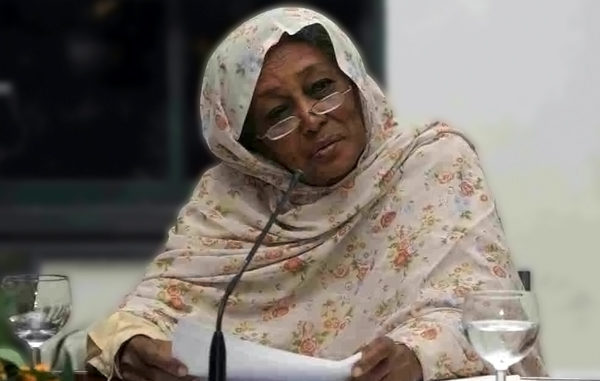
Originally published in Teakisi Magazine
Ask any Sudanese or any African person about leading Sudanese women figures of the 20th century, and among the first mentioned names will most certainly be Fatima Ahmed Ibrahim. Born in 1933 in Khartoum to an educated family, Fatima is known for organizing the first successful strike in a girls’ elementary school, when the administration decided to replace science classes with ‘family science’, founding the Women’s Intellectual Union in 1947, and later the Sudanese Women’s Association in 1952 along with several other pioneering women’s rights activists.
First woman to be democratically elected into parliament in 1965, representing the Sudanese Communist Party through which she fought her long battle for women’s rights in Sudan: the right to vote, equal pay, maternity leave benefits, pensions, and removal of male custody.
Her political and personal life was turbulent: opposing 3 dictatorships meant countless jail and house arrest sentences, and finally exile. Her union leader husband, Elshafie Ahmed Elsheikh, was executed at the hand of the Nimeri regime after a failed coup in 1973, and later, she and her party were thrown out of parliament after the decision to outlaw and dissolve the Communist Party.
But she did not give up. Her fight for human rights continued inside the country and out of it. She authored books, led unions in Sudan from her exile in the United Kingdom, and was internationally recognized for her efforts. She fought dictator after dictator and remained a thorn in the oppressor’s side until the end.
And yet, at the time of her passing on August 12th, Fatima leaves us in a place not too far from where she found us to start with. Illiteracy among women at almost 50%, FGM rates soaring, harassment of women a common and even government-supported issue, and a regime that imprisons, tortures and humiliates its already broken people. We are no longer leaders, with our education and health system in shambles and non-existent diplomatic presence. Is this what she fought so hard to grant us?
Fatima Ibrahim’s death shows us that there is still a long, long way to go. The fight she and her sisters started is far from over. Her death shows us that that progress and the war for basic rights is a drawn out, exhausting and a collective battle, with a heavy burden that needs to be continuously and consistently pushed up. We cannot lay back and be content with the efforts and sacrifices of those before us.
It is not enough that these women fought for our rights to be where we are today. We need to continue to deliver these rights for those yet to come.
For women in Sudan and Africa, there was always a Fatima before us, but she isn’t enough. We should all be Fatima, for our own and for the sake of those generations to come.